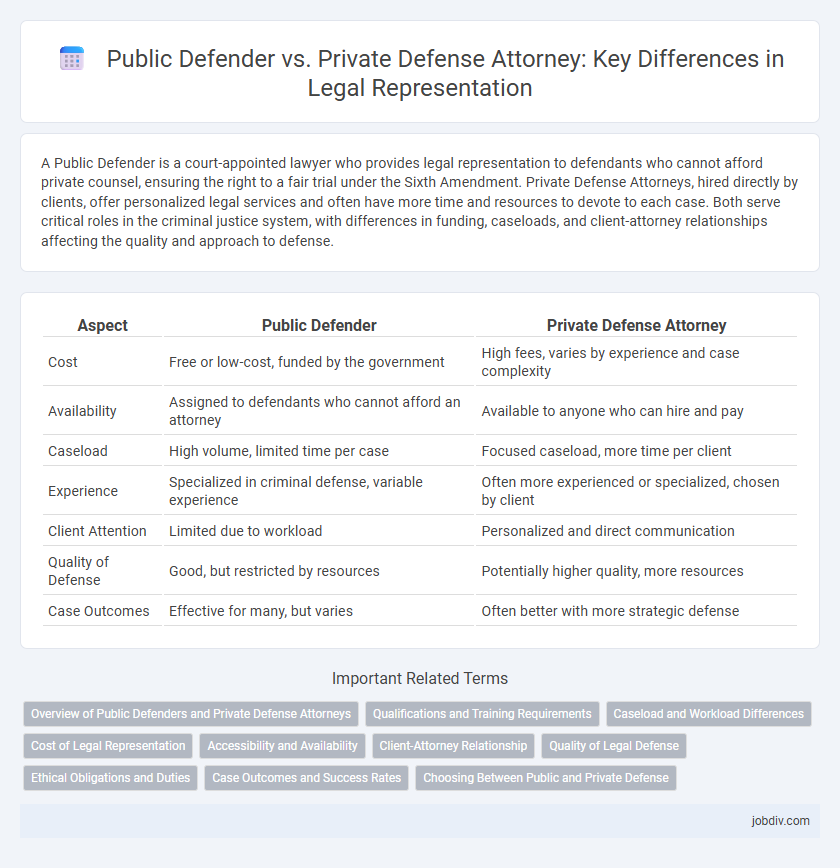A Public Defender is a court-appointed lawyer who provides legal representation to defendants who cannot afford private counsel, ensuring the right to a fair trial under the Sixth Amendment. Private Defense Attorneys, hired directly by clients, offer personalized legal services and often have more time and resources to devote to each case. Both serve critical roles in the criminal justice system, with differences in funding, caseloads, and client-attorney relationships affecting the quality and approach to defense.
Table of Comparison
| Aspect | Public Defender | Private Defense Attorney |
|---|---|---|
| Cost | Free or low-cost, funded by the government | High fees, varies by experience and case complexity |
| Availability | Assigned to defendants who cannot afford an attorney | Available to anyone who can hire and pay |
| Caseload | High volume, limited time per case | Focused caseload, more time per client |
| Experience | Specialized in criminal defense, variable experience | Often more experienced or specialized, chosen by client |
| Client Attention | Limited due to workload | Personalized and direct communication |
| Quality of Defense | Good, but restricted by resources | Potentially higher quality, more resources |
| Case Outcomes | Effective for many, but varies | Often better with more strategic defense |
Overview of Public Defenders and Private Defense Attorneys
Public defenders are government-appointed attorneys who provide legal representation to individuals unable to afford private counsel, ensuring the constitutional right to defense in criminal cases. Private defense attorneys are hired by clients and often offer broader flexibility in case management, specialized expertise, and personalized attention throughout trial and negotiation processes. Both play critical roles in the justice system, but public defenders generally manage higher caseloads with limited resources, while private attorneys have the advantage of dedicated time and sometimes advanced investigative support.
Qualifications and Training Requirements
Public defenders are licensed attorneys who have completed law school and passed the bar exam, receiving specialized training in criminal defense through government-funded programs and extensive courtroom experience. Private defense attorneys also hold law degrees and bar admission but often invest in additional certifications and continuing legal education tailored to complex or high-profile cases. Both require strong legal knowledge, but public defenders typically manage higher caseloads, emphasizing practical, on-the-job training, while private attorneys may access broader resources and specialized mentorship.
Caseload and Workload Differences
Public defenders typically handle significantly higher caseloads, often representing hundreds of clients simultaneously, which can impact the amount of time dedicated to each case. Private defense attorneys usually manage smaller caseloads, enabling them to devote more personalized attention and resources to individual clients. This workload disparity influences case preparation, client communication, and overall defense strategy effectiveness.
Cost of Legal Representation
Public defenders offer legal representation at no cost for eligible defendants, funded by government resources to ensure access to justice regardless of financial status. Private defense attorneys require payment, often through hourly rates or flat fees, which can range from hundreds to thousands of dollars depending on the case complexity and attorney experience. The cost difference significantly impacts defendants' choices, with private attorneys generally providing more personalized attention but at a higher financial burden.
Accessibility and Availability
Public defenders offer accessible legal representation primarily to individuals who cannot afford private attorneys, ensuring that the right to defense is maintained regardless of financial status. Their availability is often constrained by high caseloads and limited resources, which can impact the time and attention each client receives. In contrast, private defense attorneys provide more flexible scheduling and personalized attention but require clients to bear significant financial costs, affecting accessibility for low-income defendants.
Client-Attorney Relationship
Public defenders often manage higher caseloads, resulting in limited time for individualized client-attorney interaction, potentially impacting the depth of trust and communication. Private defense attorneys typically offer more personalized attention, fostering stronger client-attorney relationships through dedicated time and tailored legal strategies. The quality of interaction influences case outcomes, making the client-attorney relationship a critical factor in criminal defense.
Quality of Legal Defense
Public defenders often manage high caseloads which can limit the time devoted to each case, potentially impacting the quality of legal defense. Private defense attorneys typically offer more personalized attention and can dedicate additional resources to build a stronger defense strategy. Studies indicate that clients with private attorneys may experience better outcomes due to increased access to investigative support and expert witnesses.
Ethical Obligations and Duties
Public defenders are ethically obligated to provide competent and diligent representation to all clients, regardless of case complexity or client resources, ensuring equal access to justice under the Sixth Amendment. Private defense attorneys must adhere to similar ethical standards but often balance client interests with potential conflicts arising from fee arrangements or personal beliefs. Both roles require strict confidentiality, zealous advocacy, and avoidance of conflicts of interest to uphold the integrity of the legal process.
Case Outcomes and Success Rates
Public defenders often handle higher caseloads, which can impact the time and resources dedicated to each case compared to private defense attorneys. Studies indicate private defense attorneys generally achieve higher success rates in securing favorable outcomes, partly due to their ability to allocate more focused attention and specialized expertise. Case outcomes tend to improve with private attorneys, especially in complex legal matters requiring thorough investigation and strategic defense planning.
Choosing Between Public and Private Defense
Choosing between a public defender and a private defense attorney depends on factors such as case complexity, financial resources, and desired attorney-client engagement. Public defenders are court-appointed and typically handle high caseloads, offering cost-effective legal representation for those unable to afford private counsel. Private defense attorneys provide personalized attention and specialized expertise but require direct payment, influencing access to tailored defense strategies and potential outcomes.
Public Defender vs Private Defense Attorney Infographic

 jobdiv.com
jobdiv.com